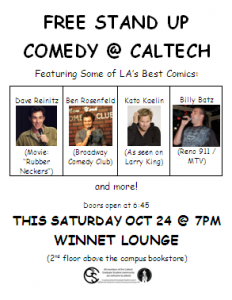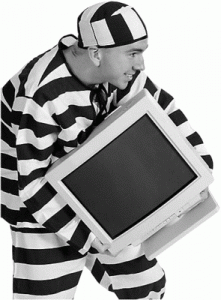I’m not an expert at producing shows, but I’ve put together four of my own and have helped out with a bunch of other shows. Producing a show is one of the best ways to get stage time before you’re “passed” at a club or booking consistent road work. When you produce your own show you need to be able to manage four equally important parts: the venue, the comics, the attendance and the actual show. This post focuses on the audience and getting them to come to the show.
Congratulations! You’ve booked a venue and you have great comedians booked to your show. Now you have to worry about getting an audience. Comedy isn’t any fun without people in the seats. While part of how you promote your show depends on the venue it’s at, most of it depends on you and your willingness to sell the show (even if it’s a free show).
Here are some common methods to let people know your show exists and that they should come to it:
This is current the most popular way to promote an event. Because it’s so popular, I find it to be the least effective. I get 10 event invitations a day on Facebook and I’m not that popular. I’ve found that for every 100 people I invite on facebook that are in the area (don’t invite people living in NYC to a show in LA, that just shows your laziness and pisses people off), it’s a good day when two show up. While it’s not that effective, I still think you should create a facebook event because it will help build awareness over time for a recurring show. Just don’t let facebook invites be the only way you promote your show.
Timing: If you invite everyone a month before hand, they’ll click “yes” then forget about it before the day of your show. If you invite everyone the day of the event, they already have plans. I think 2 to 5 days before the event is a good time to put it up a facebook event.
A.k.a. Facebook for people with A.D.D. While you need to be friends with someone on facebook for them to get invited to your show, anyone can read your posts on twitter. If someone happens to come across your post and is in the area, you might get random drop ins. Providing a discount code or mentioning it’s free will help here.
Timing: Post on twitter the day of the show. So much information flows through twitter that anything posted in advance is quickly forgotten.
Flyers
Design a flyer that states the date, time, location and description of the show. Photos of the comics also help. When designing a flier you need to pick a size. Will it be an 8.5” x 11” or bigger so you can tape it on walls in highly trafficked areas or will it be postcard sized so that you can hand it out to individual people wherever you go. Ideally, you should have both.

Timing: Design the fliers as soon as your comics are booked. Post large fliers at the venue as soon as they are designed. Post fliers around town 3-5 days before the show. Consider having someone pass out fliers for an hour before the show to get last minute “impulse” customers.
If someone has attended a previous show of yours, collect their email address and add them to your mailing list. Then send an email to your list promoting your show. Make sure you don’t do this too often, lest your emails get marked as spam. (I’d recommend sending an email no more than once a month, even if you have a weekly show.)
Timing: Once a month, preferably a few days before a show
Phone Calls
The good old human touch is most effective and most time consuming. Call your friends and anyone else who was dumb enough to give you their phone number (within reason) and let them know about the show. Better yet combine this with other methods for maximized effectiveness. For example, call everyone who has said they are attending via facebook and say you’re looking forward to seeing them at the show tomorrow. That will drastically increase the chances that they show up.
Timing: Call people a week or two before the show and just mention the show in conversation. Then call the day before the show to remind them. This is a huge time investment, but if you have the patience, this can be very worthwhile (or at the very least, provide for new material when people start giving you crazy excuses for why they can’t make it).
Have Comics Bring Audience
Tell some or all of the comics in the show that they need to bring _ # of people in order to be part of the show. This can motivate comedians to get their friends to show up. However, not all comics do “bringers” so this will be more effective with newer comics which might bring down the quality of the show. (But having no audience also brings down the quality of the show.) While instituting a bringer requirement will push awaymore established comics, it doesn’t hurt to remind the non-bringer comics that while it’s not required, if they did bring people, it would be much appreciated.
Timing: Tell the comics when you book them about their bringer requirement so that they have time to invite people and to decide if they still want to do your show. Then the night of the show, keep track of how many people each comic has brought.
Constant Pimping
Whenever you talk to someone, mention your show at some point during the conversation. Hopefully you have some social tact and this isn’t the first or last thing that you discuss with them.
Timing: Always, that’s why I called this “constant pimping”
Note on College Promoting:
College shows are the easiest to promote: If you can do the following three things, I’d be shocked if the event isn’t a success:
- Put up fliers around campus 5 to 7 days before the show
- Convince someone in administration to send an email announcement about the show to the student body on your behalf (write the email for them so all they have to do is copy and paste and hit send)
- Create a Facebook event and invite everyone you know at the school (or if you don’t go to the school, get a popular student to do it for you).
Next up: Running The Show
Wanna try stand-up comedy yourself? I teach a Comedy Class in New York City. I also do private one-on-one comedy coaching (in-person or via Zoom).
More Stand-Up Comedy Tips:
- 10 Steps to Become a Great MC
- 3 Tips To Planning A Successful Comedy Show
- Are Any Topics Off Limits?
- Barking Tips
- Dealing With Hecklers
- Five Tips For Your Comedy Event To Run Smoothly
- How I Got 100,000 TikTok Followers In 51 Days
- How To Make Money In Comedy
- How To Put Together A Great College Comedy Show
- How To Record Your Own Comedy Album
- How To Self Publish A Book Through Kickstarter
- My Writing Process
- Not Connecting With The Audience?
- Organizing Jokes
- Overcoming Stage Fright
- Producing a Show: Getting Audience
- Producing a Show: Running The Show
- Producing a Show: The Comics
- Producing a Show: The Venue
- Ten Tips To Succeed During a Check Spot
- The 8 Different Types of Comedy Audiences
- The Pecking Order
- Treat It Like a Job
- Types of Shows for Beginners
- Types of Spots
- What To Do When Nobody Laughs
- Your First Stand Up Performance


 Clayton Fletcher is a national headliner who performs all over the USA in various clubs and colleges. He has been seen on MTV, Sex & the City, and Rikki Lake. His live comedy show, The Clayton Fletcher Show, takes place every Friday and Saturday at 8PM at New York Comedy Club. For more, visit
Clayton Fletcher is a national headliner who performs all over the USA in various clubs and colleges. He has been seen on MTV, Sex & the City, and Rikki Lake. His live comedy show, The Clayton Fletcher Show, takes place every Friday and Saturday at 8PM at New York Comedy Club. For more, visit 